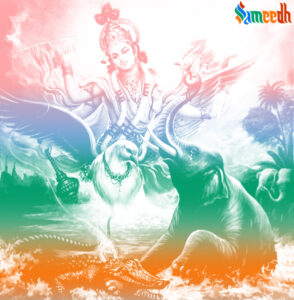The story of Gajendra Moksh is a well-known episode from Hindu mythology, and it is primarily narrated in the Bhagavata Puran (also known as the Srimad Bhagavatam). The episode illustrates the power of devotion and surrender to the Supreme Being, showcasing how sincere prayer can lead to liberation (moksh).

Background:
Gajendra, the king of elephants, was once a great devotee of Lord Vishnu in his past life. However, due to a curse, he was reborn as an elephant in the forest. In this new life, Gajendra continued to carry his devotion to Lord Vishnu in his heart.
The Incident:
One day, while Gajendra and his herd were enjoying a leisurely time in a lake, a crocodile attacked Gajendra. Despite his immense strength, Gajendra found himself trapped by the powerful jaws of the crocodile. As the struggle continued for a thousand years, Gajendra grew weaker and realized that he could not free himself.
Gajendra’s Prayer:
Realizing his helpless situation, Gajendra finally called out to Lord Vishnu with deep devotion. In his distress, he composed a beautiful hymn, the Gajendra Stuti, praising the glories of Lord Vishnu and seeking His help.
In his prayer, Gajendra expressed his helplessness, acknowledged the supremacy of the Lord, and sought refuge:
“O Supreme Lord, I offer my obeisances unto You. You are the original consciousness, and You possess unlimited potencies. I offer my respects to You, the all-pervading Lord Vishnu, who is the reservoir of all goodness.”
Lord Vishnu’s Arrival:
Hearing Gajendra’s sincere and heartfelt prayer, Lord Vishnu, mounted on Garuda, swiftly appeared on the scene. The Lord, holding His Sudarshana Chakra (discus), approached Gajendra.
Liberation of Gajendra:
With a single touch of His divine discus, Lord Vishnu severed the crocodile’s grip on Gajendra’s leg. Gajendra was immediately freed from the clutches of the crocodile. Overwhelmed with gratitude and devotion, Gajendra bowed before Lord Vishnu.
Moral and Spiritual Significance:
The story of Gajendra Moksha teaches the importance of surrender and devotion in times of distress. Gajendra, despite being a mighty elephant, humbly surrendered to the Supreme Lord when faced with a life-threatening situation. The episode emphasizes the idea that sincere prayers and unwavering devotion can lead to liberation and the end of the cycle of birth and death (samsar).
This story is often cited in the context of bhakti (devotion) and the compassionate nature of the divine, as Lord Vishnu swiftly responds to the genuine call for help from His devotee.